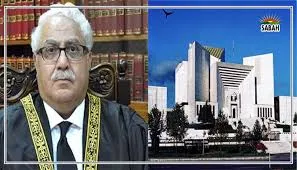A leading developer, Zahid Rafiq, on Thursday conceded before the Supreme Judicial Council (SJC) he had arranged £5,000 for the daughter of Sayyed Mazahar Ali Akbar Naqvi, a retired judge of the Supreme Court facing references for misconduct.
Mr Rafiq, who owns eight to ten companies including Lahore Smart City (Pvt) Ltd, Capital City (Pvt) Ltd and Future Development Holding (Pvt) Ltd, informed the SJC he was told the money was needed to meet an emergency. He arranged the funds through one of his friends in the United Arab Emirates.
Headed by Chief Justice of Pakistan (CJP) Qazi Faez Isa, the five-member SJC held proceedings against Justice Naqvi, facing ten references even after his resignation on Jan 10.
The prosecution witness said the judge did not repay the amount and his company made an adjustment from the accounts of Mohammad Safdar Khan, also a businessman and another witness in the case.
Witness testifies Justice Naqvi did not repay the amount; SJC told judge’s sons were allotted plots in Islamabad, Lahore at concessional rates
Mr Safdar, who provided land to Smart City, had purchased from the former judge a house situated in Gulberg, Lahore, measuring two kanals and four marlas for Rs130 million. He, however, committed to providing documents on Friday about the running accounts maintained by his company in favour of Mr Safdar.
The witness was not sure about arranging in 2022 any booking in the Montcalm Royal London House for ten days for Tasadduq Mustafa Naqvi, the son of the former judge.
Mr Rafiq said he was introduced to the former judge by Mr Safdar about five years ago, who took him to the latter’s GOR Lahore residence. He also attended the marriage ceremony of one of his sons, though he never met any other judges of the superior courts.
On April 16, 2019, his company allotted a 500-square-yard plot each to the two sons of the judge at Capital Smart City Islamabad at a concessional rate. The sons deposited a down payment out of ten payments, totalling Rs5.4 million each.
However, the witness added, the balance amount has not been paid to date. Yet, the company transferred the plots in the names of the judge’s sons. The witness provided documents to this effect.
When he said the allotments were made at the request of Mr Safdar, the CJP quipped, was Mr Safdar doling out sadqa (charity) from the owner’s pocket, or blackmailing him.
Mr Rafiq replied that he usually favours friends, explaining that Mr Safdar has been working with him for the last ten years, helping to buy lands for different projects on his behalf.
He stated that two commercial plots of 100sqyds each were also allotted to the judge’s sons in Lahore by the Lahore Smart City at a concessional rate of 10pc when the total land cost was Rs8m each, that too on Mr Safdar’s request. Subsequently, these commercial plots were transferred into the names of the sons, who later sold them.
The witness produced March 19, 2019 letters issued by Future Development Holdings in favour of Tasadduq Mustafa Naqvi who was appointed legal adviser of the company on a monthly salary of Rs150,000 with the condition that he will not work for any other organisation.
When quizzed why his company paid Rs50m to Chaudhry Mohammad Shahbaz, who had sold four kanals — 100 Sant Jones Park property — to the former judge in Lahore, he explained he was requested by Mr Safdar to pay the money to Mr Shahbaz since Mr Safdar was a debtor of his company. When asked was it a practice of issuing such a huge amount to someone else, he said he had no idea, adding that his staff might have committed a mistake.
The CJP, however, observed that the witness had attributed everything to Mr Safdar.
Earlier, Mr Shahbaz and Masood Khan, the branch operations manager of Islamic Banking at Askari Bank Gulberg Lahore, also presented their testimonies before the court.
While concluding proceedings, the CJP reiterated that anyone wishing to cross-examine the witnesses on behalf of Justice Naqvi may do so; otherwise, the testimonies would go un-rebutted.
Justice Naqvi again wrote a letter to the SJC secretary, stating he would not be participating in the council’s proceedings. However, he said he reserved his right to address his grievances at the right and relevant forums, if and when the occasion arises.
The letter regretted that all his earlier correspondence had been ignored and disregarded by the SJC, and on many occasions, the facts of the proceedings were allegedly misstated in the minutes of the meetings.

